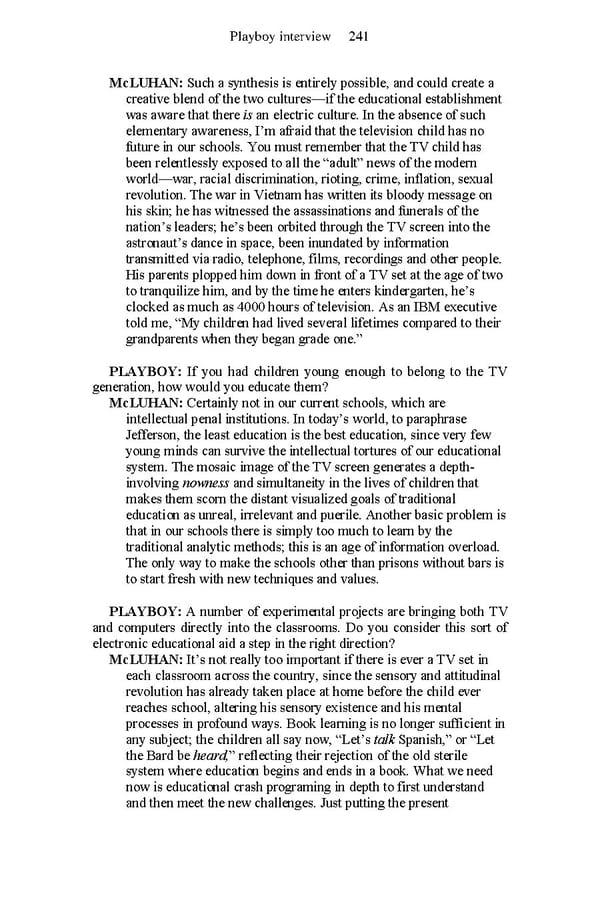Playboy interview 241 McLUHAN: Such a synthesis is entirely possible, and could create a creative blend of the two cultures—if the educational establishment was aware that there is an electric culture. In the absence of such elementary awareness, I’m afraid that the television child has no future in our schools. You must remember that the TV child has been relentlessly exposed to all the “adult” news of the modern world—war, racial discrimination, rioting, crime, inflation, sexual revolution. The war in Vietnam has written its bloody message on his skin; he has witnessed the assassinations and funerals of the nation’s leaders; he’s been orbited through the TV screen into the astronaut’s dance in space, been inundated by information transmitted via radio, telephone, films, recordings and other people. His parents plopped him down in front of a TV set at the age of two to tranquilize him, and by the time he enters kindergarten, he’s clocked as much as 4000 hours of television. As an IBM executive told me, “My children had lived several lifetimes compared to their grandparents when they began grade one.” PLAYBOY: If you had children young enough to belong to the TV generation, how would you educate them? McLUHAN: Certainly not in our current schools, which are intellectual penal institutions. In today’s world, to paraphrase Jefferson, the least education is the best education, since very few young minds can survive the intellectual tortures of our educational system. The mosaic image of the TV screen generates a depth- involving nowness and simultaneity in the lives of children that makes them scorn the distant visualized goals of traditional education as unreal, irrelevant and puerile. Another basic problem is that in our schools there is simply too much to learn by the traditional analytic methods; this is an age of information overload. The only way to make the schools other than prisons without bars is to start fresh with new techniques and values. PLAYBOY: A number of experimental projects are bringing both TV and computers directly into the classrooms. Do you consider this sort of electronic educational aid a step in the right direction? McLUHAN: It’s not really too important if there is ever a TV set in each classroom across the country, since the sensory and attitudinal revolution has already taken place at home before the child ever reaches school, altering his sensory existence and his mental processes in profound ways. Book learning is no longer sufficient in any subject; the children all say now, “Let’s talk Spanish,” or “Let the Bard be heard,” reflecting their rejection of the old sterile system where education begins and ends in a book. What we need now is educational crash programing in depth to first understand and then meet the new challenges. Just putting the present
 Essential McLuhan Page 247 Page 249
Essential McLuhan Page 247 Page 249